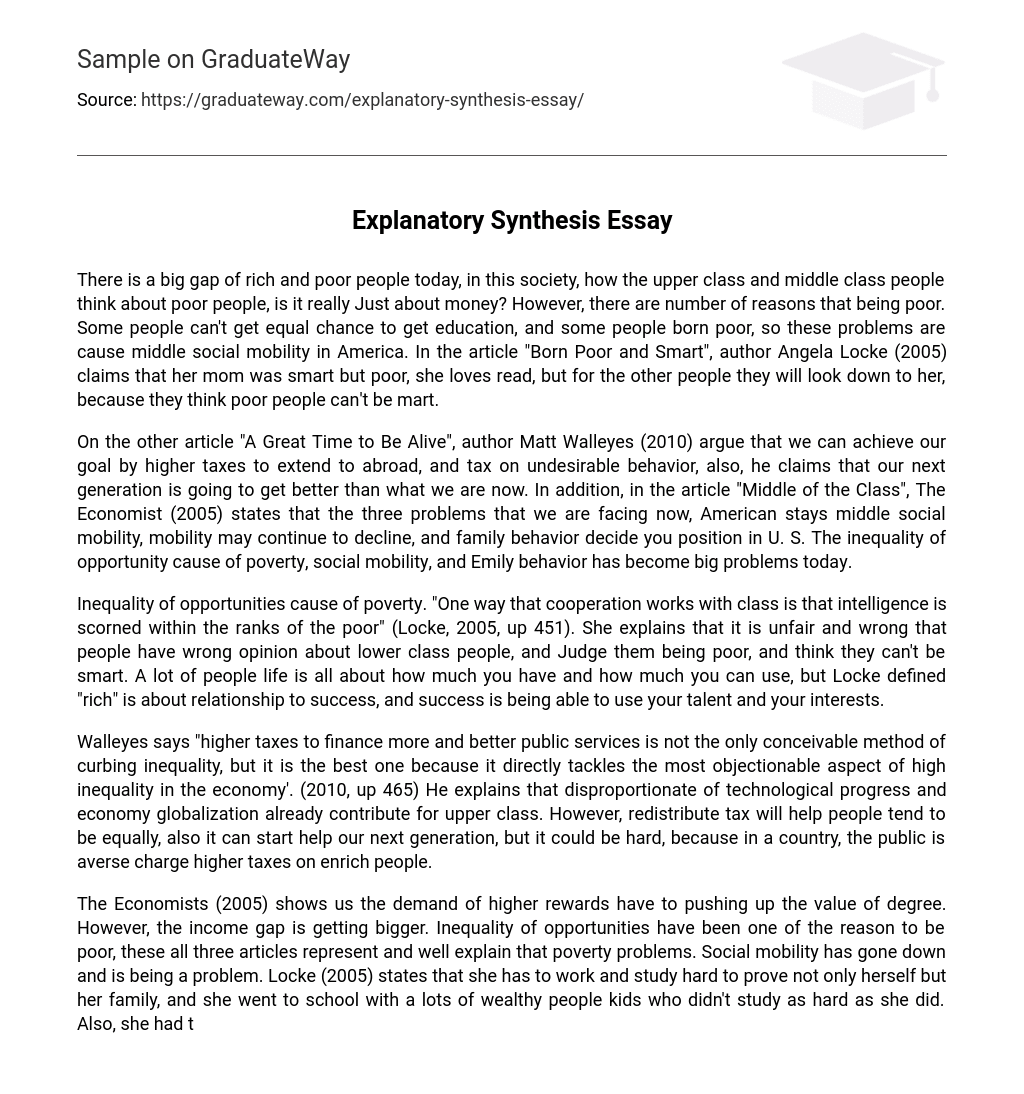There is currently a significant inequality between rich and poor individuals in society. The thoughts of the upper class and middle class towards the impoverished mainly focus on money. However, poverty is influenced by various factors such as limited access to education or being born into disadvantaged situations. As a result, social mobility within America is hindered. In her 2005 article “Born Poor and Smart,” Angela Locke shares the story of her mother who was intelligent but lived in poverty and had a love for reading. Sadly, society tends to belittle those in poverty and overlook their intellectual potential.
According to Matt Walleyes’ article “A Great Time to Be Alive” (2010), achieving our goals can be accomplished by implementing higher taxes both domestically and abroad, as well as imposing taxes on undesirable behavior. Walleyes also asserts that the next generation will surpass our current achievements.
The Economist’s article “Middle of the Class” (2005) highlights three current issues: stagnant social mobility in America, a potential continuation of declining mobility, and the impact of family behavior on one’s socioeconomic position in the United States. The inequality of opportunity contributes to problems like poverty, limited social mobility, and negative behavior displayed by individuals such as Emily.
According to Locke (2005), inequality of opportunities is a key contributor to poverty. She argues that there is a widespread prejudice against intelligence among the lower class, leading to unfair judgment and misconceptions about their abilities. Many people prioritize material possessions and wealth, but Locke defines richness in terms of the ability to utilize one’s talents and interests for success.
According to Walleyes, there are alternative methods to tackle inequality, such as technological advancements and globalization. However, the most efficient approach is raising taxes in order to enhance public services. This directly confronts the main issue of excessive inequality in the economy. The redistribution of taxes can contribute to establishing a more egalitarian society and positively impact future generations. Nonetheless, implementing this strategy may face difficulties due to potential opposition towards imposing higher taxes on affluent individuals.
The Economists (2005) states that the value of a degree is increasing due to the desire for higher rewards, which in turn widens income inequality. These articles highlight how poverty is largely caused by unequal opportunities. Locke’s (2005) personal experience illustrates the importance of social mobility, as she had to work hard and study diligently to support her family while attending school alongside affluent classmates who didn’t put in the same level of effort. Additionally, she had to serve coffee to build connections with others.
The text suggests that studying and working hard are the only solutions to address social mobility. The Economist argues that there are significant issues in today’s society. Firstly, social mobility in the US is not as high as Americans anticipate. The Economist (2005, up 484) reports that “despite America’s labor markets being more flexible, social mobility there is no longer greater than in class-stratified Europe, and it appears to be declining.” Secondly, the decline in social mobility may persist due to fundamental economic changes that necessitate higher education for higher income.
However, both authors discuss the issue of social mobility as a current problem. Economists propose that policy changes, such as providing assistance to impoverished college students, can reduce social inequality and enhance social mobility. Family behavior serves as an indicator of poverty or success. Locke (2005) argues that the low social standing she experienced resulted from being born into an unhealthy family. Her mother worked and studied tirelessly to fit in with others, but societal divisions predetermined her position despite her utmost efforts.
According to The Economists (2005, up 485), family behavior plays a role in the upward movement of individuals. The author suggests that being wealthy is no longer solely determined by money, but also by the dynamics within the family. Both authors stress the importance of family behavior, emphasizing that it encompasses more than just financial aspects but also includes the structure. As a result, poverty, social mobility, and family behavior contribute to the growing inequality in opportunities. Presently, these three issues are worsening and creating a larger divide between those who are economically disadvantaged and those who are affluent.
By working and studying hard as individuals, or by implementing higher taxes for the wealthy and redistributing to the entire population for improved public services and social mobility, we can prevent this issue. The current policy has brought about changes such as federal assistance for impoverished college students and reforming the financing of education. However, it is crucial that Americans themselves are the ones to recognize and address these problems. If we follow this approach and work towards solving these issues, social mobility in America will increase, providing hope for future generations and potentially alleviating these pressing concerns.





